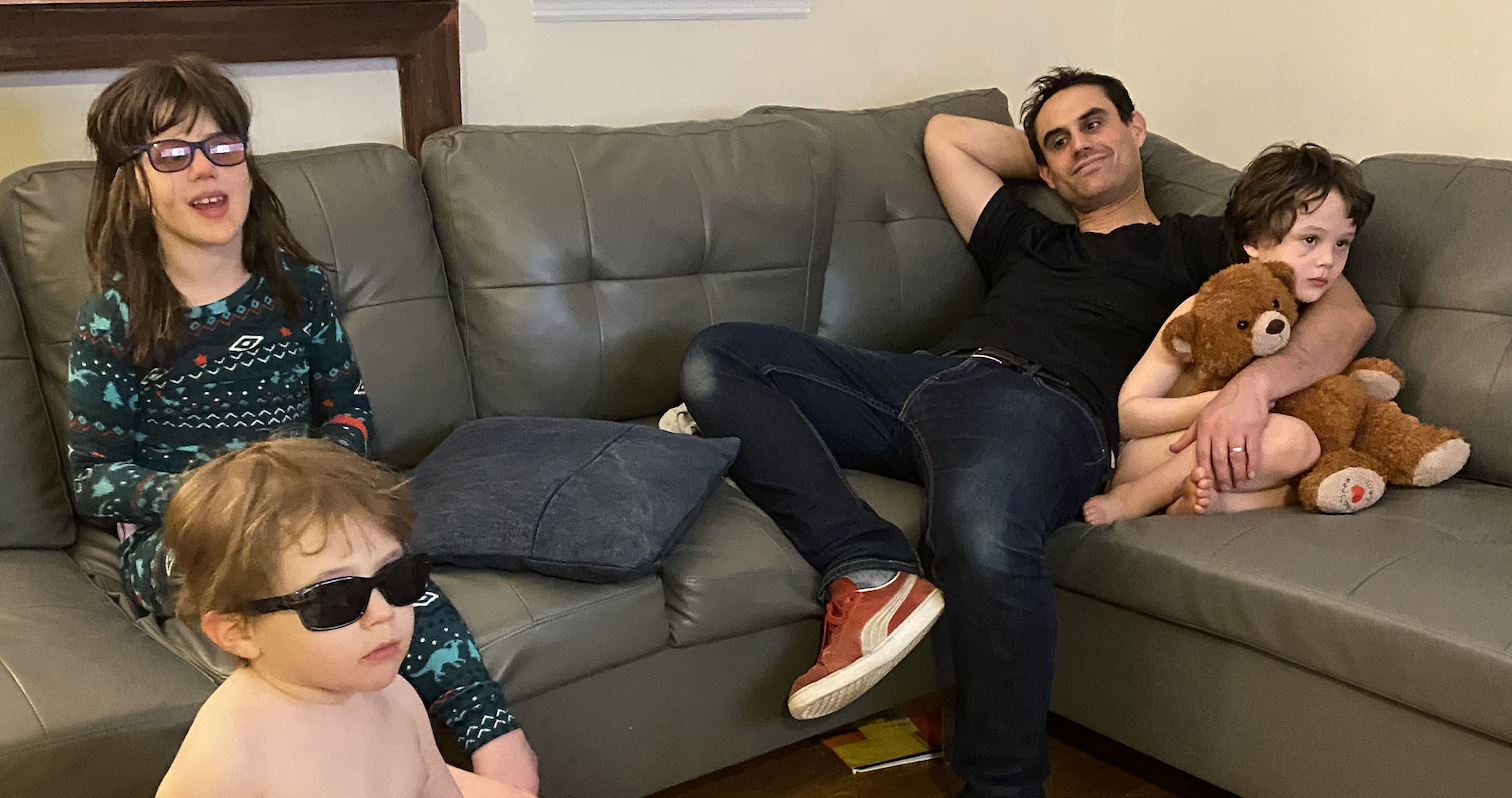Past Notes on Being Zoe’s Father
Some say the notes app is the new window to the soul… or maybe, if you’re like me, it’s more of a journal. I’ve documented my journey as Zoe’s father throughout the years, capturing the ups and downs, birthdays, doubts and miracles. It’s raw and reflective and I hope it sheds some light on the realities of fatherhood.
March 2014: Zoe Two
Zoe can’t sit up on her own, and that doesn’t seem to be changing. We are in a despair that terrifies us and the people around us. Hopes of her learning to swallow turn into a couple hours a week holding her down while Mer inserts a feeding apparatus into her nose while Zoe screams.
We cringe as friends lament how “stressful” it is that their children are now walking and moving too fast to chase down, and to think so far ahead about things like college funds. We say nothing, of course, because who wants to be friends with two people who shut off your dance music and put on Black Metal or Nick Drake, two people who force you to look at your worst fears, when you were just trying to throw back a beer and enjoy a New Orleans porch? We say nothing, of course, because we need friends more than ever.
December 2014: Zoe almost three.
Our schools are known for helping kids with some of the greatest challenges graduate high school and college. But it’s hard work; takes every waking hour (and quite a few formerly non-waking ones) to see big changes. That work stirs my anxiety as a dad. I can rouse excitable teachers to tackle a challenge, but that’s nothing at all like my moments at home—alone at night, trying to find something on google to restore hope, something that explains why Zoe isn’t having breakthroughs anymore, feeling like I’m failing my only child. How do people keep summoning that kind of strength for their kids when everyone else is convinced this is already a lost cause?
But this is the thing. The thing we’d already decided against with Zoe. Every chance possible. All the work that can be done should be done. But couldn’t it possibly get a little easier? A little less uncomfortable?
It’s clear this struggle isn’t about ignoring darkness and doubt. It’s about some combination of treating the setbacks as real and still picturing success in the future, a future with no dates or deadlines attached. I can’t describe what this approach is. That’s all I got.
November 2017: Zoe five.
“I need help,” she says to me, trying to climb a step I know she can handle on her own.
“Nah, you got it.” Holy God, please help me believe I’m not hurting her right now.
“I need help! Hard!” This heartbreaking combo of ignoring your child’s immediate needs while trying to serve bigger ones is often what helps Zoe grow. Zoe is a kid who will never stop growing. “But Zoe. You love hard things, right?”
She smiles, looks down at her shoes. Then says it again: “I need help.”
She gets it. But not until we go back and forth for another five minutes.
We often have to think the best thing to do is ignore her assertions of what she couldn’t do. Aiming for things barely possible means truly confronting why they’re so hard—students you believe in but then give you every reason to stop, Zoe’s increasing panic as I ignore her on that step—and why perhaps as humans we aren’t emotionally strong enough to aim this high.
I think about the podcast on Daniel Kish. In his training for blind children, he requires parents to let their blind children sense their way through dangerous hurdles using his sonar technique. A mom who’s spent years worrying for her child’s safety must watch as he marches into a busy street, runs through a bumpy path, nears the edge of a steep trail. She must watch and not yell out a warning, not grab him to keep him safe. He won’t be able to truly grow his senses unless he can protect himself in these moments. The very love we feel for our kids will foul up their greatest opportunities for growth. Supporting growth like this just doesn’t feel good.
April 2018: Zoe six.
She is talking and interacting with people, spitting lyrics, and shooting a basketball on our porch under an oak. She is disabled still, and it is obvious. She doesn’t walk with a perfect gait. One of her eyes is turned inward. Her language is a few years behind her cohort. Sometimes she struggles to identify objects or understand what someone is telling her. She is pursuing her passions, loving her friends, and growing.
I watch her explore our front yard and grow fascinated by her in new ways. She lives entirely in the moment. She loves people and plays hard with her mother, her little brothers, her school friends. She wants to play with people more than toys, and she gleefully follows them, talks with them, chases them, and learns from them.
She is irrepressible, and there is a joy in her that is abnormal—that doesn’t express the countless hours that she, Mer, all of us had put into getting her there.
I confessed to Meredith that I’m away so often that sometimes Zoe felt like someone else’s child, and how much that scared me, that after all this I’m still not sure what it feels like to be a dad.
The lessons of this struggle will surely be irreplaceable, already the source of our most inspiring and fulfilling beliefs, the passion I feel in my career, and maybe in life overall. And I can never forget the truth that I’d still do anything to keep it from happening.
Always darkness with joy and success, the certainty that for this to continue, there will be pain and self-doubt profound enough to ruin days and weeks at a time. And I think, “Because that’s what this ‘miracle’ work requires.”
Expecting and performing what we imagine to be impossible is brutal, excruciating work that forces you to contend with the worst in yourself, to look in mirrors you hoped not to. I now believe that is why people don’t try it much. Miracles hurt. That’s why we have to make performing them a little more normal.



